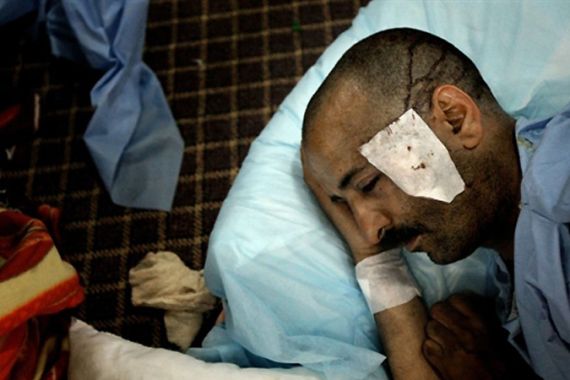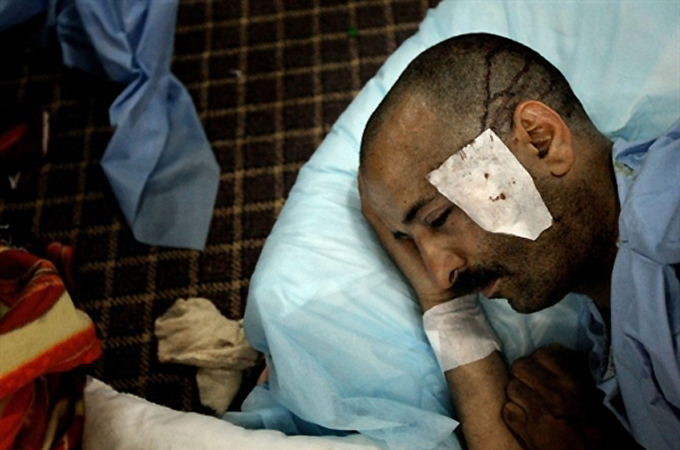War crimes court to seek Libya warrants
International Criminal Court chief prosecutor says three figures in Gaddafi government could face charges.

 |
| Crimes against humanity are still being carried out by Gaddafi’s regime in Libya, the ICC prosecutor says [AFP] |
The chief prosecutor for the International Criminal Court (ICC) has told the UN Security Council that he will seek three arrest warrants for crimes against humanity in Libya.
Charges against the three members of the Libyan government may include murder and unlawful detention, use of cluster bombs and rape as a weapon, Luis Moreno-Ocampo said on Wednesday.
The UN Security Council referred the Libyan violence to the ICC in February.
Moreno-Ocampo is investigating Libyan leader Muammar Gaddafi, some of his sons and aides over a “pre-determined plan” to attack protesters.
He did not, however, name the targets of the arrest warrants, which he said he will request in several weeks for crimes against humanity committed in Libya since February 15.
“Crimes against humanity have been and continue to be committed in Libya, attacking unarmed civilians including killings and persecutions in many cities across Libya,” the prosecutor said in a statement.
The prosecutor added that he was also investigating the deaths of dozens of sub-Saharan Africans in the rebel capital of Benghazi by an “angry mob” who believed they were mercenaries for Gaddafi.
Khalid Kaim, the Libyan deputy foreign minister, dismissed the ICC allegations saying Moreno-Ocampo’s report painted a partial picture.
“Any decision or any conclusion can Mr. Ocampo draw out of his visit to Benghazi and to Egypt will be just one party review or one party position,” Kaim said.
“Of course, since we are not party of the ICC, we cannot invite Mr. Ocampo but instead of that we can invite another fact-finding mission from the [UN] Security Council.”
Rape as a weapon
Moreno-Ocampo said there were allegations that Africans from other nations had been attacked in rebel territory because they were thought to be mercenaries.
Alleged criminal incidents include security forces opening live fire at unarmed peaceful protesters, using rape as well as “systemic arrests, torture, killings, deportations, enforced disappearances and destruction of mosques” as a weapon, according to the prosecutor’s report.
While a precise number is hard to provide, up to 700 people were killed in February alone, the report said. Gaddafi estimates that “only 150 or 200” have been killed.
The United Nations High Commissioner for Refugees has said almost 40,000 people fled fighting in western Libya last month.
“Not obliged”
Moreno-Ocampo urged states to prepare for arrests should ICC judges decide to issue warrants, stressing “now is the time to start planning on how to implement possible arrest warrants.”
The ICC has no police force and relies on state co-operation to enforce arrests. Despite NATO bombing operations that are intended to protect civilians, Libya has been plunged into civil war, seriously complicating efforts to arrest ICC suspects.
Libya is not an ICC member state and is therefore not obliged to arrest the court’s suspects. Several members of the UN security council – the United States, Russia and China – are not ICC members, but voted in favour of referring Libya to the court.
The International Federation for Human Rights (FIDH), a Paris-base alliance of international human rights organisations, welcomed the prosecutor’s report on Wednesday.
“FIDH stresses that this was an unprecedented move: it was the first unanimous referral the ICC has ever received from the Security Council and this referral led to the opening of an investigation within only 5 days,” the organisation said in a statement.
NATO criticised
There was also growing criticism of air strikes on Libya by the NATO military alliance.
UN Security Council powers publicly crossed swords over the Libya conflict on Wednesday with Russia and China leading criticism of international coalition air raids.
Both called for greater efforts to reach a ceasefire. France reaffirmed the West’s case that the international community had to intervene to defend civilians.
Vitaly Churkin, Russia’s UN envoy, raised alarm at the growing number of civilian casualties in the Libyan conflict.
“Unfortunately it must be noted that actions by NATO-led coalition forces also lead to civilian casualties. This took place in particular during recent bombings of Tripoli,” Churkin told the 15-nation Security Council.
Russia and China accuse the coalition of going beyond the UN mandate, particularly with strikes such as a raid on Saturday in which one of Gaddafi’s sons and three of his grandchildren were killed.
“Any disproportionate use of force is unacceptable,” Churkin said.
China called for the “complete and strict implementation” of Security Council resolutions.
“We are not in favor of any arbitrary interpretation of the council’s resolutions nor are we in favor of any actions that go beyond its mandate,” Li Baodong, China’s envoy, said.
Giovanni Martinelli, the Vatican’s delegate in Tripoli, called for a halt to NATO air strikes in Libya and for the West to negotiate with Gaddafi’s government.
“I am speaking in the name of my conscience and in the name of my role as pastor and also in the name of the Gospels,” Martinelli said, after attending Gaddafi’s son funeral.
“We are strong when we can find dialogue and Gaddafi is not against dialogue,” Martinelli said.
That position contrasts with that of NATO, which has refused a call by the African Union to negotiate a ceasefire between Gadhafi’s regime and the rebels trying to oust him. NATO has refused to cut back its operations to give space to diplomatic initiatives.